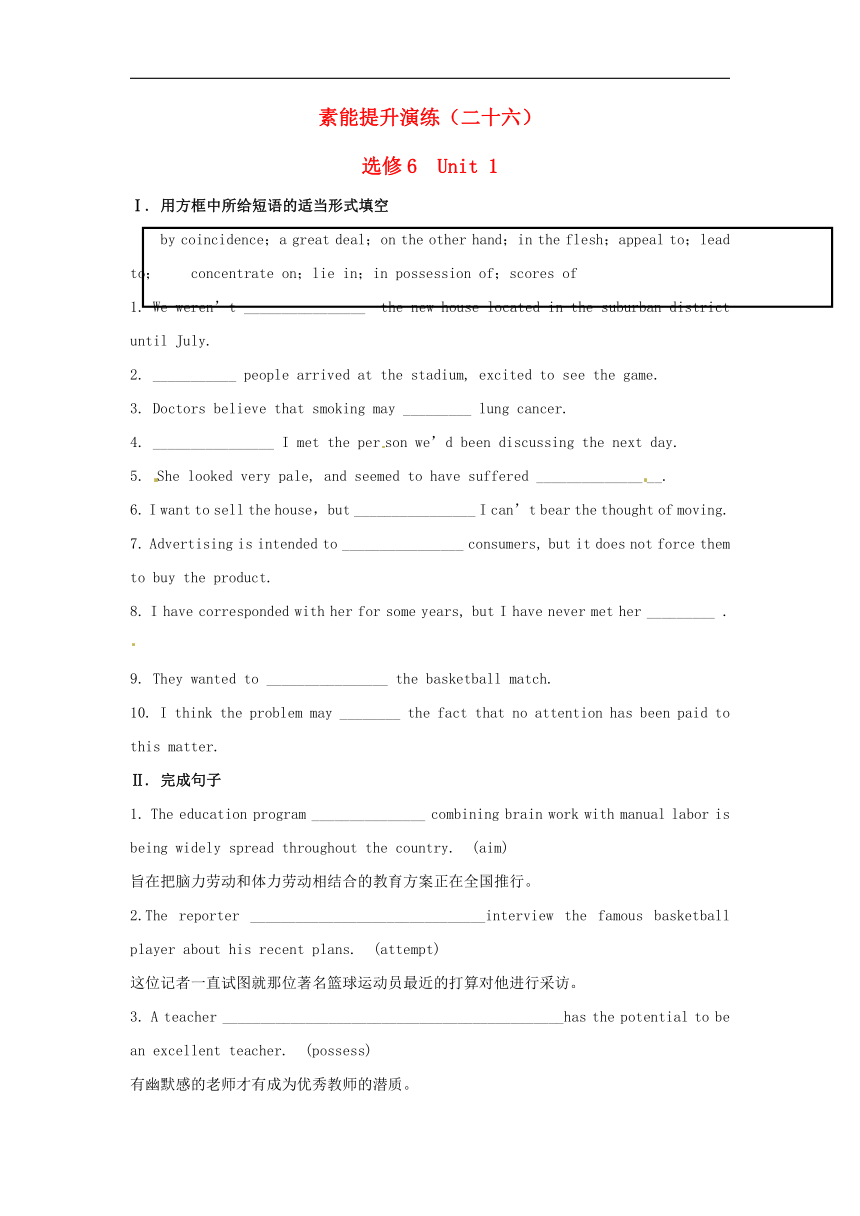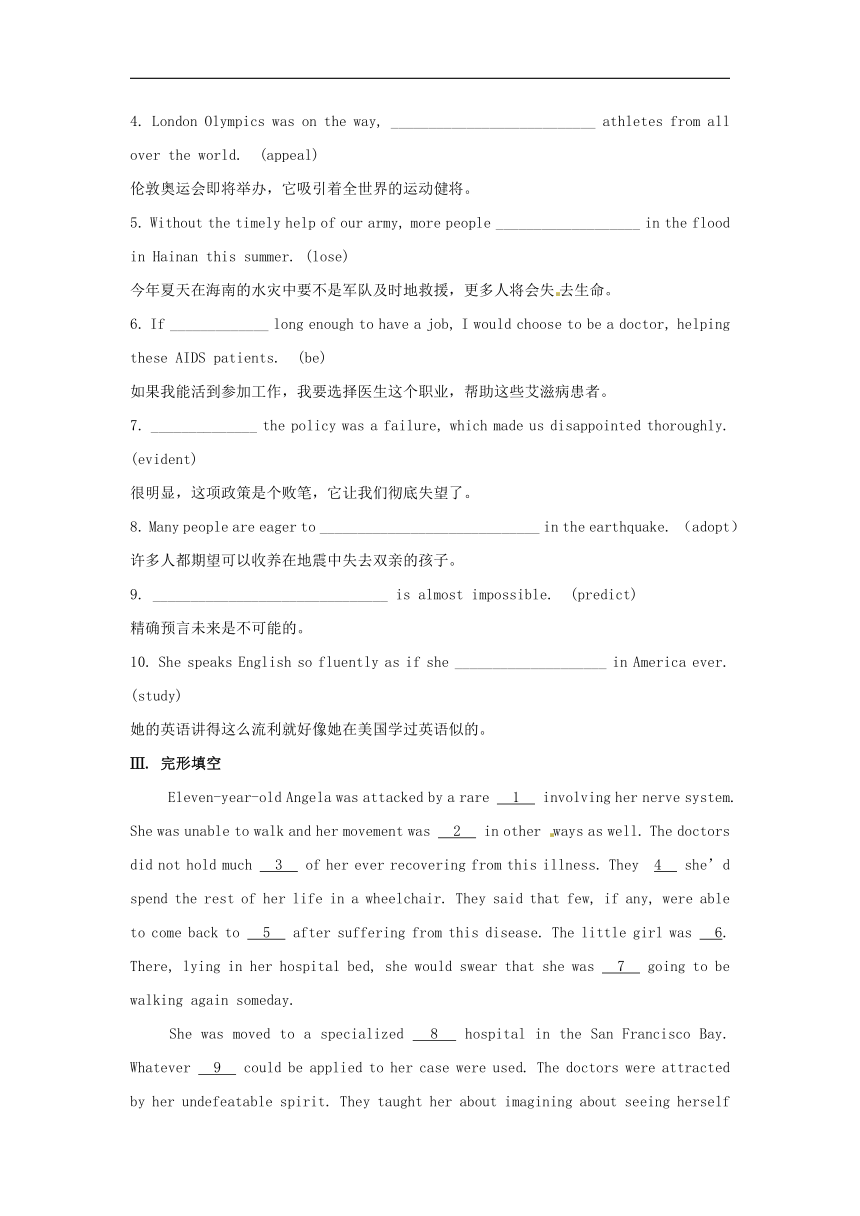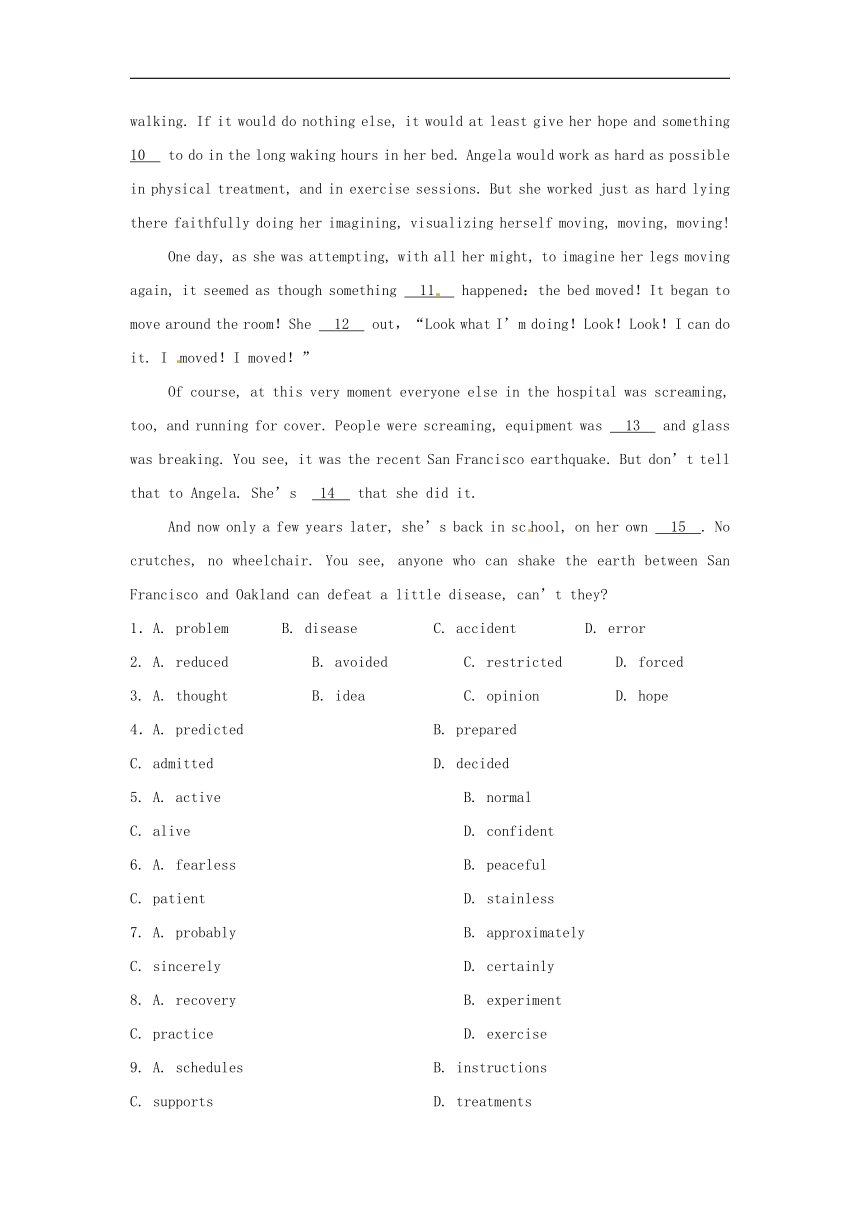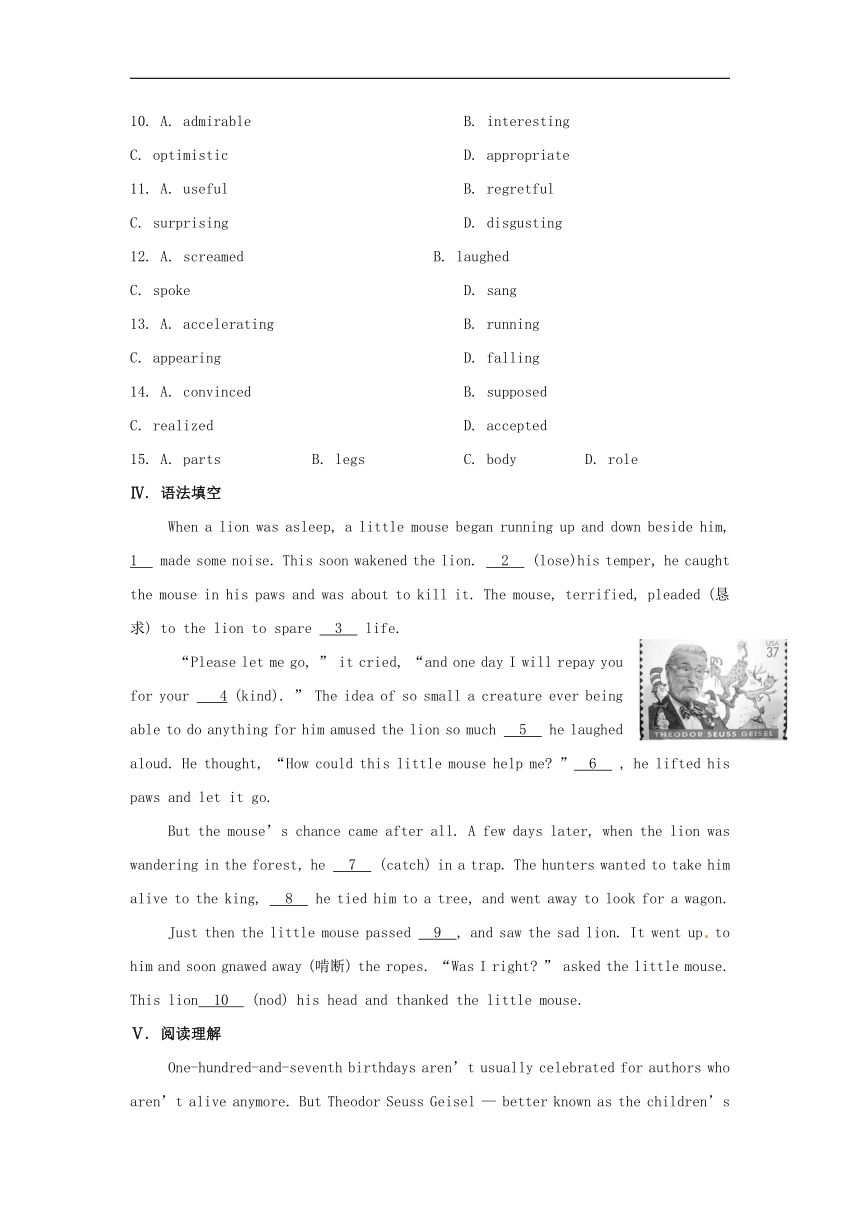人教版(新课程标准)选修6 Unit 1 Art 素能提升演练(二十六) (有答案解析)
文档属性
| 名称 | 人教版(新课程标准)选修6 Unit 1 Art 素能提升演练(二十六) (有答案解析) |

|
|
| 格式 | doc | ||
| 文件大小 | 74.5KB | ||
| 资源类型 | 教案 | ||
| 版本资源 | 人教版(新课程标准) | ||
| 科目 | 英语 | ||
| 更新时间 | 2023-01-31 00:00:00 | ||
图片预览




文档简介
素能提升演练(二十六)
选修6 Unit 1
Ⅰ. 用方框中所给短语的适当形式填空
by coincidence;a great deal;on the other hand;in the flesh;appeal to;lead to; concentrate on;lie in;in possession of;scores of
1. We weren’t ________________ the new house located in the suburban district until July.
2. ___________ people arrived at the stadium, excited to see the game.
3. Doctors believe that smoking may _________ lung cancer.
4. ________________ I met the person we’d been discussing the next day.
5. She looked very pale, and seemed to have suffered ________________.
6. I want to sell the house,but ________________ I can’t bear the thought of moving.
7. Advertising is intended to ________________ consumers, but it does not force them to buy the product.
8. I have corresponded with her for some years, but I have never met her _________ .
9. They wanted to ________________ the basketball match.
10. I think the problem may ________ the fact that no attention has been paid to this matter.
Ⅱ. 完成句子
1. The education program _______________ combining brain work with manual labor is being widely spread throughout the country. (aim)
旨在把脑力劳动和体力劳动相结合的教育方案正在全国推行。
2.The reporter _______________________________interview the famous basketball player about his recent plans. (attempt)
这位记者一直试图就那位著名篮球运动员最近的打算对他进行采访。
3. A teacher _____________________________________________has the potential to be an excellent teacher. (possess)
有幽默感的老师才有成为优秀教师的潜质。
4. London Olympics was on the way, ___________________________ athletes from all over the world. (appeal)
伦敦奥运会即将举办,它吸引着全世界的运动健将。
5. Without the timely help of our army, more people ___________________ in the flood in Hainan this summer. (lose)
今年夏天在海南的水灾中要不是军队及时地救援,更多人将会失去生命。
6. If _____________ long enough to have a job, I would choose to be a doctor, helping these AIDS patients. (be)
如果我能活到参加工作,我要选择医生这个职业,帮助这些艾滋病患者。
7. ______________ the policy was a failure, which made us disappointed thoroughly. (evident)
很明显,这项政策是个败笔,它让我们彻底失望了。
8. Many people are eager to _____________________________ in the earthquake. (adopt)
许多人都期望可以收养在地震中失去双亲的孩子。
9. _______________________________ is almost impossible. (predict)
精确预言未来是不可能的。
10. She speaks English so fluently as if she ____________________ in America ever. (study)
她的英语讲得这么流利就好像她在美国学过英语似的。
Ⅲ. 完形填空
Eleven-year-old Angela was attacked by a rare 1 involving her nerve system. She was unable to walk and her movement was 2 in other ways as well. The doctors did not hold much 3 of her ever recovering from this illness. They 4 she’d spend the rest of her life in a wheelchair. They said that few, if any, were able to come back to 5 after suffering from this disease. The little girl was 6. There, lying in her hospital bed, she would swear that she was 7 going to be walking again someday.
She was moved to a specialized 8 hospital in the San Francisco Bay. Whatever 9 could be applied to her case were used. The doctors were attracted by her undefeatable spirit. They taught her about imagining about seeing herself walking. If it would do nothing else, it would at least give her hope and something 10 to do in the long waking hours in her bed. Angela would work as hard as possible in physical treatment, and in exercise sessions. But she worked just as hard lying there faithfully doing her imagining, visualizing herself moving, moving, moving!
One day, as she was attempting, with all her might, to imagine her legs moving again, it seemed as though something 11 happened:the bed moved!It began to move around the room!She 12 out,“Look what I’m doing!Look!Look!I can do it. I moved!I moved!”
Of course, at this very moment everyone else in the hospital was screaming, too, and running for cover. People were screaming, equipment was 13 and glass was breaking. You see, it was the recent San Francisco earthquake. But don’t tell that to Angela. She’s 14 that she did it.
And now only a few years later, she’s back in school, on her own 15 . No crutches, no wheelchair. You see, anyone who can shake the earth between San Francisco and Oakland can defeat a little disease, can’t they
1.A. problem B. disease C. accident D. error
2. A. reduced B. avoided C. restricted D. forced
3. A. thought B. idea C. opinion D. hope
4.A. predicted B. prepared
C. admitted D. decided
5. A. active B. normal
C. alive D. confident
6. A. fearless B. peaceful
C. patient D. stainless
7. A. probably B. approximately
C. sincerely D. certainly
8. A. recovery B. experiment
C. practice D. exercise
9. A. schedules B. instructions
C. supports D. treatments
10. A. admirable B. interesting
C. optimistic D. appropriate
11. A. useful B. regretful
C. surprising D. disgusting
12. A. screamed B. laughed
C. spoke D. sang
13. A. accelerating B. running
C. appearing D. falling
14. A. convinced B. supposed
C. realized D. accepted
15. A. parts B. legs C. body D. role
Ⅳ. 语法填空
When a lion was asleep, a little mouse began running up and down beside him, 1 made some noise. This soon wakened the lion. 2 (lose)his temper, he caught the mouse in his paws and was about to kill it. The mouse, terrified, pleaded (恳求) to the lion to spare 3 life.
“Please let me go, ” it cried, “and one day I will repay you for your 4 (kind). ” The idea of so small a creature ever being able to do anything for him amused the lion so much 5 he laughed aloud. He thought, “How could this little mouse help me ” 6 , he lifted his paws and let it go.
But the mouse’s chance came after all. A few days later, when the lion was wandering in the forest, he 7 (catch) in a trap. The hunters wanted to take him alive to the king, 8 he tied him to a tree, and went away to look for a wagon. Just then the little mouse passed 9 , and saw the sad lion. It went up to him and soon gnawed away (啃断) the ropes. “Was I right ” asked the little mouse. This lion 10 (nod) his head and thanked the little mouse.
Ⅴ. 阅读理解
One-hundred-and-seventh birthdays aren’t usually celebrated for authors who aren’t alive anymore. But Theodor Seuss Geisel — better known as the children’s books author Dr. Seuss —who came into the world on 2 March, 1904, was an unusual man.
Like generations of children I was raised on his wonderful stories. But when I now read them to my children it’s not just the childhood memories I enjoy. His writing is brilliant and imaginative and flows with a self-confidence as sure as the words of a Shakespeare poem. Readers ride his characteristic rhythm with an effortless joy that cannot be matched by any other modern writer:
You have brains in your head
You have feet in your shoes
You can steer yourself any direction you choose
And will you succeed
Yes indeed, yes indeed!
Ninety-eight and three-quarters percent guaranteed.
Seuss’s brilliant cartoons and clever words make his books a delight for adults but they appeal most to children of course. His stories teach kids moral lessons but in indirect and entertaining ways.
The first Seuss book I was given was The Lorax, written just as the 60s were becoming the 70s. Seuss was ahead of his time, and in this book the dawn of concern for environmental problems are shown as the Lorax “who speaks for the trees” battles against an evil businessman who wants to destroy the forest and make goods “which everyone needs”.
It’s not only a warning of the heavy price of environmental destruction, written well before most people had thought to worry, but it’s also a smart analysis of consumer societies: “Unless someone like you cares a whole awful lot, nothing is going to get better. It’s not. ” This is of course a moral message, but not of the kind designed to persuade the youngsters into behavior that adults want.
I could go on, but hey, it’s a birthday, and I’m sure you folks have some good toasts to raise for the party. . .
1. What’s the purpose of this passage
A. To introduce Dr. Seuss’s life.
B. To analyse Dr. Seuss’s books.
C. To describe Dr. Seuss’s writing style.
D. To celebrate Dr. Seuss’s achievements.
2. Why does the author include Dr. Seuss’s poem
A. To encourage readers to use their brains and choose their own way.
B. To give readers a sample of Seuss’s story The Lorax.
C. To provide readers with an example of Seuss’s writing style.
D. To explain how relevant Seuss’s stories remain today.
3. Why do adults also enjoy Seuss’s books
A. His words and pictures are imaginative enough to be enjoyed by all.
B. His books give children obvious moral messages to learn from.
C. He writes about adult topics in a way that is understandable to children.
D. He was the first person to write about the environment.
4. When was the book The Lorax written
A. Early 1960s. B. Early 1970s.
C. Late 1960s. D. Late 1970s.
5. Which of the following is true about Seuss
A. Many of the issues he discussed attracted greater concern in later years.
B. He is widely considered as the twentieth-century Shakespeare.
C. His books are more popular now than when they were first published.
D. Most readers thought his ideas were difficult to understand.
答案解析
Ⅰ. 1. in possession of 2. Scores of 3. lead to 4. By coincidence
5. a great deal 6. on the other hand 7. appeal to 8. in the flesh
9. concentrate on 10. lie in
Ⅱ. 1.(that/which is) aimed at
2.has been attempting/making attempts to
3.who possesses/(who is) possessed of a sense of humor
4.which appealed/appealing to
5.would have lost their lives
6.I were to live
7.It was evident that
8.adopt the children losing their parents
9.Predicting the future accurately
10.had studied English
Ⅲ. 本文讲述的是一位十一岁的小姑娘患神经系统疾病后以坚强的意志战胜疾病从而重新站立起来的故事。
1.【解析】选B。从前面的was attacked及后面的her nerve system可知应填“疾病”一词。
2.【解析】选C。从She was unable to walk可以看出她在其他方面也受到限制。
3.【解析】选D。由前面可以看出,医生对她的恢复不抱任何希望。
4.【解析】选A。根据后面的过去将来时态可知此处表示“他们预测她会在轮椅上度过余生”。
5.【解析】选B。此空表示患了这种病的人几乎没有能恢复正常的。normal是名词,其他是形容词,意义也不通。
6.【解析】选A。从后面的话可以看出,她没有被疾病吓倒,故填fearless,表示“无畏的”。
7.【解析】选D。从前面的swear可以看出她对于自己能重新站起来充满信心,故选D。表示“一定能站起来”。
8.【解析】选A。做了手术后她被转移到“康复医院”,故填recovery。
9.【解析】选D。这里用表示“治疗方式”的词,凡能用的治疗方法都用在她身上了。故填treatments。
10.【解析】选C。从give her hope可知应该填optimistic。
11.【解析】选C。从the bed moved!说明“奇迹发生了”。故选C。
12.【解析】选A。只有用screamed才能表达她此时的惊奇的心情。
13.【解析】选D。因发生地震,设备掉落,故填falling。
14.【解析】选A。从But don’t tell that to Angela. 表示要让她相信是她把床移动的而不是地震。
15.【解析】选B。on one’s own legs固定搭配,表示“自立”之意。
Ⅳ. 本文是故事记叙文,通过小老鼠也能帮狮子解围的故事,说明不要小瞧小人物的道理。
1. 【解析】which 前后都有主谓结构用连词,which引导非限制性定语从句,在从句中作主语。
2.【解析】Losing 考查谓语或非谓语,losing引导现在分词短语作原因状语。
3.【解析】its 名词短语缺少定语,人称代词 its 指代 the mouse’s。
4.【解析】kindness 介词短语缺少宾语,名词形式kindness作宾语。
5.【解析】that 前后都有主谓结构用连词,that引导结果状语从句,so. . . that表示”如此……以至于”。
6.【解析】However 副词however表示转折,修饰整个句子。
7.【解析】was caught 及物动词要带宾语,后面没有宾语则是宾语前置,谓语用被动形式。
8.【解析】so 前后都有主谓结构用连词,so引导并列句,表示”因此”。
9.【解析】by 动状短语搭配,pass by从旁经过。
10.【解析】nodded 考查谓语或非谓语,讲述过去的事情用一般过去时。
Ⅴ. 1.【解析】选D。写作意图题。该文是为纪念Seuss诞辰107周年写的,作者结合自己的经历来介绍Seuss取得的成就。
2.【解析】选C。推理判断题。根据第二段最后一句可知,作者在介绍Seuss的写作风格,语言带有轻松快乐的节奏,作者给出诗的原因就是让读者去体会他的这种写作风格。
3.【解析】选A。细节理解题。根据倒数第四段第一句“Seuss’s brilliant cartoons and clever words make his books a delight for adults. . . ”可知,他书中极棒的漫画和充满智慧的语言使所有人喜欢他的书。
4.【解析】选C。推理判断题。根据第一段结尾可知,他出生于1904年3月2日;根据倒数第三段第一句可知他写这本书时,60多岁,已近70岁,因此可推知他写该书的时间应该在20世纪60年代末。
5.【解析】选A。推理判断题。根据倒数第三段内容可知,他超前于他的时代,意识到了环境的重要性,因此A项陈述正确。
选修6 Unit 1
Ⅰ. 用方框中所给短语的适当形式填空
by coincidence;a great deal;on the other hand;in the flesh;appeal to;lead to; concentrate on;lie in;in possession of;scores of
1. We weren’t ________________ the new house located in the suburban district until July.
2. ___________ people arrived at the stadium, excited to see the game.
3. Doctors believe that smoking may _________ lung cancer.
4. ________________ I met the person we’d been discussing the next day.
5. She looked very pale, and seemed to have suffered ________________.
6. I want to sell the house,but ________________ I can’t bear the thought of moving.
7. Advertising is intended to ________________ consumers, but it does not force them to buy the product.
8. I have corresponded with her for some years, but I have never met her _________ .
9. They wanted to ________________ the basketball match.
10. I think the problem may ________ the fact that no attention has been paid to this matter.
Ⅱ. 完成句子
1. The education program _______________ combining brain work with manual labor is being widely spread throughout the country. (aim)
旨在把脑力劳动和体力劳动相结合的教育方案正在全国推行。
2.The reporter _______________________________interview the famous basketball player about his recent plans. (attempt)
这位记者一直试图就那位著名篮球运动员最近的打算对他进行采访。
3. A teacher _____________________________________________has the potential to be an excellent teacher. (possess)
有幽默感的老师才有成为优秀教师的潜质。
4. London Olympics was on the way, ___________________________ athletes from all over the world. (appeal)
伦敦奥运会即将举办,它吸引着全世界的运动健将。
5. Without the timely help of our army, more people ___________________ in the flood in Hainan this summer. (lose)
今年夏天在海南的水灾中要不是军队及时地救援,更多人将会失去生命。
6. If _____________ long enough to have a job, I would choose to be a doctor, helping these AIDS patients. (be)
如果我能活到参加工作,我要选择医生这个职业,帮助这些艾滋病患者。
7. ______________ the policy was a failure, which made us disappointed thoroughly. (evident)
很明显,这项政策是个败笔,它让我们彻底失望了。
8. Many people are eager to _____________________________ in the earthquake. (adopt)
许多人都期望可以收养在地震中失去双亲的孩子。
9. _______________________________ is almost impossible. (predict)
精确预言未来是不可能的。
10. She speaks English so fluently as if she ____________________ in America ever. (study)
她的英语讲得这么流利就好像她在美国学过英语似的。
Ⅲ. 完形填空
Eleven-year-old Angela was attacked by a rare 1 involving her nerve system. She was unable to walk and her movement was 2 in other ways as well. The doctors did not hold much 3 of her ever recovering from this illness. They 4 she’d spend the rest of her life in a wheelchair. They said that few, if any, were able to come back to 5 after suffering from this disease. The little girl was 6. There, lying in her hospital bed, she would swear that she was 7 going to be walking again someday.
She was moved to a specialized 8 hospital in the San Francisco Bay. Whatever 9 could be applied to her case were used. The doctors were attracted by her undefeatable spirit. They taught her about imagining about seeing herself walking. If it would do nothing else, it would at least give her hope and something 10 to do in the long waking hours in her bed. Angela would work as hard as possible in physical treatment, and in exercise sessions. But she worked just as hard lying there faithfully doing her imagining, visualizing herself moving, moving, moving!
One day, as she was attempting, with all her might, to imagine her legs moving again, it seemed as though something 11 happened:the bed moved!It began to move around the room!She 12 out,“Look what I’m doing!Look!Look!I can do it. I moved!I moved!”
Of course, at this very moment everyone else in the hospital was screaming, too, and running for cover. People were screaming, equipment was 13 and glass was breaking. You see, it was the recent San Francisco earthquake. But don’t tell that to Angela. She’s 14 that she did it.
And now only a few years later, she’s back in school, on her own 15 . No crutches, no wheelchair. You see, anyone who can shake the earth between San Francisco and Oakland can defeat a little disease, can’t they
1.A. problem B. disease C. accident D. error
2. A. reduced B. avoided C. restricted D. forced
3. A. thought B. idea C. opinion D. hope
4.A. predicted B. prepared
C. admitted D. decided
5. A. active B. normal
C. alive D. confident
6. A. fearless B. peaceful
C. patient D. stainless
7. A. probably B. approximately
C. sincerely D. certainly
8. A. recovery B. experiment
C. practice D. exercise
9. A. schedules B. instructions
C. supports D. treatments
10. A. admirable B. interesting
C. optimistic D. appropriate
11. A. useful B. regretful
C. surprising D. disgusting
12. A. screamed B. laughed
C. spoke D. sang
13. A. accelerating B. running
C. appearing D. falling
14. A. convinced B. supposed
C. realized D. accepted
15. A. parts B. legs C. body D. role
Ⅳ. 语法填空
When a lion was asleep, a little mouse began running up and down beside him, 1 made some noise. This soon wakened the lion. 2 (lose)his temper, he caught the mouse in his paws and was about to kill it. The mouse, terrified, pleaded (恳求) to the lion to spare 3 life.
“Please let me go, ” it cried, “and one day I will repay you for your 4 (kind). ” The idea of so small a creature ever being able to do anything for him amused the lion so much 5 he laughed aloud. He thought, “How could this little mouse help me ” 6 , he lifted his paws and let it go.
But the mouse’s chance came after all. A few days later, when the lion was wandering in the forest, he 7 (catch) in a trap. The hunters wanted to take him alive to the king, 8 he tied him to a tree, and went away to look for a wagon. Just then the little mouse passed 9 , and saw the sad lion. It went up to him and soon gnawed away (啃断) the ropes. “Was I right ” asked the little mouse. This lion 10 (nod) his head and thanked the little mouse.
Ⅴ. 阅读理解
One-hundred-and-seventh birthdays aren’t usually celebrated for authors who aren’t alive anymore. But Theodor Seuss Geisel — better known as the children’s books author Dr. Seuss —who came into the world on 2 March, 1904, was an unusual man.
Like generations of children I was raised on his wonderful stories. But when I now read them to my children it’s not just the childhood memories I enjoy. His writing is brilliant and imaginative and flows with a self-confidence as sure as the words of a Shakespeare poem. Readers ride his characteristic rhythm with an effortless joy that cannot be matched by any other modern writer:
You have brains in your head
You have feet in your shoes
You can steer yourself any direction you choose
And will you succeed
Yes indeed, yes indeed!
Ninety-eight and three-quarters percent guaranteed.
Seuss’s brilliant cartoons and clever words make his books a delight for adults but they appeal most to children of course. His stories teach kids moral lessons but in indirect and entertaining ways.
The first Seuss book I was given was The Lorax, written just as the 60s were becoming the 70s. Seuss was ahead of his time, and in this book the dawn of concern for environmental problems are shown as the Lorax “who speaks for the trees” battles against an evil businessman who wants to destroy the forest and make goods “which everyone needs”.
It’s not only a warning of the heavy price of environmental destruction, written well before most people had thought to worry, but it’s also a smart analysis of consumer societies: “Unless someone like you cares a whole awful lot, nothing is going to get better. It’s not. ” This is of course a moral message, but not of the kind designed to persuade the youngsters into behavior that adults want.
I could go on, but hey, it’s a birthday, and I’m sure you folks have some good toasts to raise for the party. . .
1. What’s the purpose of this passage
A. To introduce Dr. Seuss’s life.
B. To analyse Dr. Seuss’s books.
C. To describe Dr. Seuss’s writing style.
D. To celebrate Dr. Seuss’s achievements.
2. Why does the author include Dr. Seuss’s poem
A. To encourage readers to use their brains and choose their own way.
B. To give readers a sample of Seuss’s story The Lorax.
C. To provide readers with an example of Seuss’s writing style.
D. To explain how relevant Seuss’s stories remain today.
3. Why do adults also enjoy Seuss’s books
A. His words and pictures are imaginative enough to be enjoyed by all.
B. His books give children obvious moral messages to learn from.
C. He writes about adult topics in a way that is understandable to children.
D. He was the first person to write about the environment.
4. When was the book The Lorax written
A. Early 1960s. B. Early 1970s.
C. Late 1960s. D. Late 1970s.
5. Which of the following is true about Seuss
A. Many of the issues he discussed attracted greater concern in later years.
B. He is widely considered as the twentieth-century Shakespeare.
C. His books are more popular now than when they were first published.
D. Most readers thought his ideas were difficult to understand.
答案解析
Ⅰ. 1. in possession of 2. Scores of 3. lead to 4. By coincidence
5. a great deal 6. on the other hand 7. appeal to 8. in the flesh
9. concentrate on 10. lie in
Ⅱ. 1.(that/which is) aimed at
2.has been attempting/making attempts to
3.who possesses/(who is) possessed of a sense of humor
4.which appealed/appealing to
5.would have lost their lives
6.I were to live
7.It was evident that
8.adopt the children losing their parents
9.Predicting the future accurately
10.had studied English
Ⅲ. 本文讲述的是一位十一岁的小姑娘患神经系统疾病后以坚强的意志战胜疾病从而重新站立起来的故事。
1.【解析】选B。从前面的was attacked及后面的her nerve system可知应填“疾病”一词。
2.【解析】选C。从She was unable to walk可以看出她在其他方面也受到限制。
3.【解析】选D。由前面可以看出,医生对她的恢复不抱任何希望。
4.【解析】选A。根据后面的过去将来时态可知此处表示“他们预测她会在轮椅上度过余生”。
5.【解析】选B。此空表示患了这种病的人几乎没有能恢复正常的。normal是名词,其他是形容词,意义也不通。
6.【解析】选A。从后面的话可以看出,她没有被疾病吓倒,故填fearless,表示“无畏的”。
7.【解析】选D。从前面的swear可以看出她对于自己能重新站起来充满信心,故选D。表示“一定能站起来”。
8.【解析】选A。做了手术后她被转移到“康复医院”,故填recovery。
9.【解析】选D。这里用表示“治疗方式”的词,凡能用的治疗方法都用在她身上了。故填treatments。
10.【解析】选C。从give her hope可知应该填optimistic。
11.【解析】选C。从the bed moved!说明“奇迹发生了”。故选C。
12.【解析】选A。只有用screamed才能表达她此时的惊奇的心情。
13.【解析】选D。因发生地震,设备掉落,故填falling。
14.【解析】选A。从But don’t tell that to Angela. 表示要让她相信是她把床移动的而不是地震。
15.【解析】选B。on one’s own legs固定搭配,表示“自立”之意。
Ⅳ. 本文是故事记叙文,通过小老鼠也能帮狮子解围的故事,说明不要小瞧小人物的道理。
1. 【解析】which 前后都有主谓结构用连词,which引导非限制性定语从句,在从句中作主语。
2.【解析】Losing 考查谓语或非谓语,losing引导现在分词短语作原因状语。
3.【解析】its 名词短语缺少定语,人称代词 its 指代 the mouse’s。
4.【解析】kindness 介词短语缺少宾语,名词形式kindness作宾语。
5.【解析】that 前后都有主谓结构用连词,that引导结果状语从句,so. . . that表示”如此……以至于”。
6.【解析】However 副词however表示转折,修饰整个句子。
7.【解析】was caught 及物动词要带宾语,后面没有宾语则是宾语前置,谓语用被动形式。
8.【解析】so 前后都有主谓结构用连词,so引导并列句,表示”因此”。
9.【解析】by 动状短语搭配,pass by从旁经过。
10.【解析】nodded 考查谓语或非谓语,讲述过去的事情用一般过去时。
Ⅴ. 1.【解析】选D。写作意图题。该文是为纪念Seuss诞辰107周年写的,作者结合自己的经历来介绍Seuss取得的成就。
2.【解析】选C。推理判断题。根据第二段最后一句可知,作者在介绍Seuss的写作风格,语言带有轻松快乐的节奏,作者给出诗的原因就是让读者去体会他的这种写作风格。
3.【解析】选A。细节理解题。根据倒数第四段第一句“Seuss’s brilliant cartoons and clever words make his books a delight for adults. . . ”可知,他书中极棒的漫画和充满智慧的语言使所有人喜欢他的书。
4.【解析】选C。推理判断题。根据第一段结尾可知,他出生于1904年3月2日;根据倒数第三段第一句可知他写这本书时,60多岁,已近70岁,因此可推知他写该书的时间应该在20世纪60年代末。
5.【解析】选A。推理判断题。根据倒数第三段内容可知,他超前于他的时代,意识到了环境的重要性,因此A项陈述正确。
